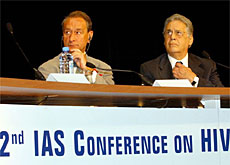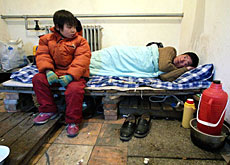Paris meeting marks 20 years in battle against Aids

Thousands of researchers from around the world are meeting in Paris to discuss advances in the science and treatment of Aids.
Experts from Geneva, Lausanne and Basel, who play a leading role in international research into Aids, will unveil their latest findings.
It is exactly 20 years ago that researchers published evidence that the human immunodeficiency virus, HIV, causes Aids.
“The main objective of this conference is to try and improve the exchange between basic and clinical scientists,” Giuseppe Pantaleo, director of the division of immunology at Lausanne University Hospital, told swissinfo.
Organisers hope that the latest advances in research will benefit people throughout the world particularly the 30 million people living with HIV/Aids in Africa.
“Scientific and clinical advances are diminished if their benefits do not reach the people suffering from the effects of HIV,” said Michel Kazatchkine, conference chairman and director of the French national agency for research on Aids.
Nelson Mandela
Some 5,000 delegates from 120 countries are attending the four-day conference.
Former presidents Nelson Mandela of South Africa and Fernando Henrique Cardoso of Brazil will talk about Aids in their respective countries.
On Tuesday scientists from the Swiss pharmaceutical company, Roche, will reveal the latest data from their studies with Fuzeon, the revolutionary drug that works by preventing HIV from entering cells of the body.
It is generally agreed that the world has come a long way since the link between HIV and Aids was identified 20 years ago.
Death sentence
Pantaleo said that HIV infection in western countries is now a chronic disease rather than a death sentence.
“Life expectation after infection with HIV is today in the range of 20-25 years, significantly different from 8-10 years when life expectancy was in the range of six to ten years,” he told swissinfo.
“In addition there have been major advances in understanding how the immune system fights against the virus and now we are starting to develop strategies to exploit the immune system of the patient to fight against the virus.”
However an effective vaccine remains years away and the question of access to medicine in developing countries is far from resolved, says humanitarian aid organisation, Médecins sans Frontières (MSF).
“Only a tiny number of people in Africa are actually receiving treatment for Aids,” said Daniel Berman of MSF’s Access to Essential Medicines campaign in Geneva.
Virus
Research in Switzerland is progressing on several fronts. Pantaleo at Lausanne University Hospital is investigating how the body responds to virus infection.
Bernard Hirschel, who heads the HIV unit at Geneva University medical school, is focusing on treatment interruptions – whether patients can take drugs for some time, stop and then start again when necessary – thereby reducing the side-effects of indefinite treatment.
At Lausanne University, a team under Amalio Telenti has been taking advantage of the sequencing of the human genome to try to understand why some people are protected from Aids while others are extremely susceptible.
All three are attending the Paris meeting and Pantaleo is a scientific co-chair of the conference.
United Nations agency UNAids says 42 million people are infected with HIV worldwide. It has killed 25 million worldwide.
The UN forecasts that by 2010, 45 million more will be infected if the pandemic continues at its current pace and 70 million will have died by 2020.
swissinfo, Vincent Landon
This year’s largest scientific and medical conference on HIV/Aids is taking place in Paris from July 13-16.
It is organised by the International Aids Society and the French National Agency for Research on Aids (ANRS).
The aim is to share the latest advances in HIV research.
Some 5,000 delegates from 120 countries are attending.
Former presidents Nelson Mandela of South Africa and Fernando Henrique Cardoso of Brazil will talk on Aids in the global South.

In compliance with the JTI standards
More: SWI swissinfo.ch certified by the Journalism Trust Initiative










You can find an overview of ongoing debates with our journalists here . Please join us!
If you want to start a conversation about a topic raised in this article or want to report factual errors, email us at english@swissinfo.ch.